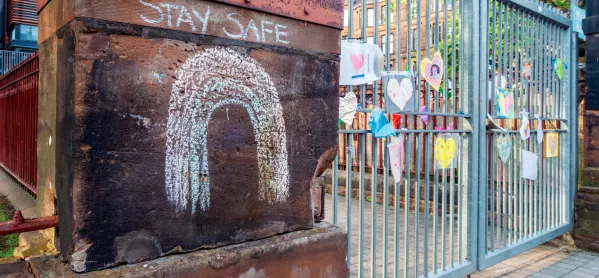School rotas will be banned under new plans for central government to take control of contingency measures for keeping children in education, cutting local health chiefs out of the picture, Tes has learned.
The existing four-tier contingency framework, which has been largely unused by the government, will be scrapped and replaced with a new “on or off” system - whereby schools are open to all or only to vulnerable pupils and children of key workers, according to a source close to the Department for Education.
The change will formalise the national policy that schools must remain fully open. The idea of partial measures dependent on local circumstances, such as rotas or some year groups being sent home, is being officially abandoned, Tes understands.
The move is likely to provoke opposition from school leaders, who have called for a planned system of rotas to end Covid “chaos”.
Local health officials in Covid hotspots like Hull who have been calling for school closures may also be alarmed by the decision to cut them out of the process.
Coronavirus: Use rotas to halt ‘alarming’ Covid rise, say teachers
School safety: No plan to introduce rotas, says government
Related: ‘Frustration’ at school rotas missing from Covid guidance
Under the new system, if the infection rate spikes in a region, meaning schools have to close, then they will close for everyone except vulnerable pupils and children of key workers - but this will be a nationally made decision.
Coronavirus: No local input over school closures
When the DfE originally announced the four-tier system for schools in areas with Covid restrictions, at the end of August, it said that: ”Local authority leaders and directors of public health, alongside national government, would be at the centre of any decision making.”
But the source said that would now change: “They have come to the conclusion that you can’t leave it to local authorities or directors of public health to move through these tiers - it’s far too complicated.
“The national policy is schools remain open regardless, and therefore you basically don’t have any regional discretion to part-shut your schools and accelerate through the tier system.
“So there is one policy, which is schools stay open, and then there’s one policy, which is if R [the Covid-19 reproduction rate] in a region spikes through the roof and they have to close, then they will close for everyone except key workers and vulnerable kids, like in March.
“But basically that is a nationally made decision. And it’s an on or off switch - it’s one or the other, and DfE decide that nationally.”
This meant that the DfE was “doubling down” on its preference for not using rotas, the source said. It comes despite growing pressure for rotas to be introduced in some areas to halt an “alarming” rise in Covid cases.
But the source said the tiers were seen as too confusing.
“Nobody understands what these bloody tiers are,” they said. “Then there’s also the dispute between the local public health officials and the DfE, and there’s just confusion generally.
“So I think they’ve just come to the conclusion that, ‘You know what - school opening is a national-level priority, we are not going to devolve down any responsibility for this, in exactly the same way that we’re not devolving down Tier 3 negotiating powers to [mayor of Greater Manchester] Andy Burnham any more, nor [are] we devolving down health disputes to engage in a discussion with Public Health England in Hull, or whatever. We are deciding you’re open or you’re closed, that’s it - end of.’”
The source told Tes that the updated plan is to be published at the beginning of next week.
The DfE has been contacted for comment.




